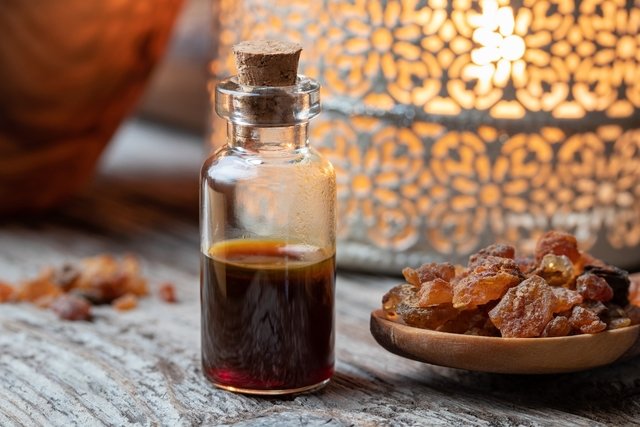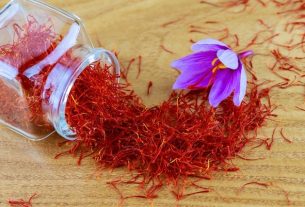Myrrh is a medicinal plant of the species Commiphora myrrhindicated for sore throat, gum inflammation, skin infections, acne or skin rejuvenation, as it has antiseptic, antimicrobial and anti-inflammatory properties.
The normally used part of myrrh is the resin extracted from the trunk of the tree, with medicinal properties, for the preparation of tincture or essential oil.
Myrrh, also known as Arabic myrrh, can be found in compounding pharmacies and some health food stores, and should be used according to the recommendation of your doctor or herbalist.

What is it for
Myrrh is indicated for:
1. Sore throat
Myrrh has anti-inflammatory, analgesic, antimicrobial and antiseptic properties that can help soothe a sore throat.
Myrrh can help relieve gum inflammation, called gingivitis, due to its antiseptic and antimicrobial action.
Additionally, myrrh can also help relieve mouth ulcers.
3. Herpes labial
Myrrh has antiviral action against the Herpes simplex virus type 1, which can help reduce the severity of cold sores and reduce the duration of symptoms, such as a stinging, burning sensation or formation of blisters on the skin, for example. .
4. Rheumatoid arthritis
Myrrh is rich in terpenes and sterols with anti-inflammatory action, which help reduce the production of substances that cause inflammation in the joints, which can help alleviate the symptoms of rheumatoid arthritis or osteoarthritis.
5. Neuropathic pain
Myrrh can help in the treatment of neuropathic pain, which is pain caused by nerve damage or inflammation in the sciatic nerve, due to its analgesic and anti-inflammatory action.
6. Respiratory infections
Myrrh has antibacterial and antiviral action due to the terpenes and sterols in its composition, and can be used to help treat respiratory infections, such as the flu.
Furthermore, myrrh has an expectorant action that can help relieve coughs caused by bronchitis or asthma, for example.
7. Gastrointestinal problems
Myrrh can help treat gastrointestinal problems, such as poor digestion or ulcerative colitis, as it has antispasmodic and anti-inflammatory properties.
8. Skin sores
Due to its astringent, antiseptic and healing properties, myrrh can be used to help heal skin wounds.
Furthermore, myrrh can also be used to help treat acne, as it also has antimicrobial action.
9. Skin rejuvenation
Myrrh essential oil, when used on the face daily as part of your skin care routine, can help prevent the appearance of wrinkles and fine lines and rejuvenate aging or wrinkled skin.
However, the oil should not be applied pure to the skin, but used diluted in a moisturizer, for example.
Despite having many health benefits, myrrh does not replace medical treatment, it only aids treatment.
How to use myrrh
Myrrh can be found in the form of a tincture, essential oil or incense and, therefore, its use may vary.
Myrrh resin should not be ingested orally as it can cause poisoning.
1. Tincture of myrrh
Myrrh tincture can be used for sore throats, canker sores, gum inflammation or mouth sores, but should only be used to rinse or gargle.
Ingredients
- 20 g of myrrh resin;
- 100 mL of 70% alcohol.
Preparation mode
Grind the myrrh resin and place it in a clean, dry glass jar covered with aluminum foil. Add the alcohol and let it sit for 10 days, shaking frequently.
After this period, you can use 5 to 10 drops of myrrh tincture in a glass of water to gargle or rinse, 2 to 3 times a day. Do not ingest as it is toxic.
2. Myrrh essential oil
Myrrh essential oil can be used to scent environments, inhalation in a vaporizer for respiratory problems or on the face.
- Air freshener: put 9 to 10 drops of myrrh essential oil in a spray bottle with 250 mL of water and spray in the places you prefer or put 3 to 4 drops in an electric air freshener;
- Inhalation for respiratory problems: add 2 drops of myrrh essential oil to a vaporizer with a little water to help eliminate phlegm in cases of bronchitis, colds or coughs;
- For topical use on the face: Place 1 to 3 drops of myrrh essential oil in your face lotion or moisturizer and use daily to help promote a refreshed skin appearance.
Myrrh essential oil can also be used to moisturize the hair, mixing 5 drops of the essential oil in 1 tablespoon of vegetable oil such as almond oil, jojoba or coconut oil, and applying it to the hair.
You should avoid applying myrrh essential oil to sensitive areas such as eyes and ears, and wash your hands with soap and water after handling the oil to avoid accidental exposure to delicate areas.
Possible side effects
The use of myrrh may cause skin irritation or allergies when used in greater quantities than recommended.
Furthermore, when ingested it can cause intoxication, with symptoms such as diarrhea, kidney problems, low blood pressure or rapid heartbeat.
When it is not indicated
Myrrh should not be used by pregnant women, as it can stimulate bleeding from the uterus and cause miscarriage, and also by breastfeeding women.
Furthermore, myrrh should not be used by people with heart problems, diabetes or who take anticoagulants such as warfarin, for example.
Myrrh essential oil and tincture should not be ingested as they can cause poisoning.
It is important to use myrrh under the guidance of a doctor, herbalist or a healthcare professional with specific knowledge of medicinal plants.

Sign up for our newsletter and stay up to date with exclusive news
that can transform your routine!
Warning: Undefined array key "title" in /home/storelat/public_html/wp-content/plugins/link-whisper-premium/templates/frontend/related-posts.php on line 12
Warning: Undefined array key "title_tag" in /home/storelat/public_html/wp-content/plugins/link-whisper-premium/templates/frontend/related-posts.php on line 13



